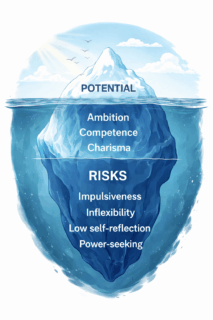
Series on BIG 5 personality traits in work settings
I often get asked, how can assessing someone’s personality play a role in predicting one’s performance in professional settings. Does it even matter? Actually, it does! Personality traits predict behavior, coping mechanisms, inner struggles and the ways that we react to outer stimuli just to name a few.
This time we will be talking about extraverts and introverts. Extraversion-introversion is on a continuum. There can be typical, high scoring extraverts, ambiverts, and typical introverts.
Research shows that high extraversion scores relate to social behavior, positive emotions, leadership and dominance, risk-taking, attention-seeking, job performance, happiness, optimism and satisfaction. Introversion, however, is linked to reflective and reserved behavior, deeper relationships, creativity and innovation, caution and risk aversion, observational skills, independent work style and depth in communication. Introversion is by no means synonymous with shyness or social anxiety. Introverts can thrive in various domains of life, leveraging their unique strengths and preferences to achieve success and fulfillment. Even though extraversion and introversion are associated with these respective characteristics, individual differences exist, and not everyone exhibits every trait to the same degree.
But the question remains — how exactly do the differences influence the work settings?
The first difference is the exchange of energy. Extraverts get charged in the presence of others and loose the energy while being alone. If a typical extravert is left working from home with no meetings scheduled, preparing for a project with not an urgent deadline than the so-called “brain fog” and procrastination can be a frequent visitor. When assessing extraverted executive candidates, I have come to a conclusion that remote work during the pandemic was close to unbearable for them. If there was a chance to be in the office, they would take it. And now they are working hard to get their team back in the office. Being around people in constant communication comforts and motivates them. They often thrive in social settings, networking events, and group discussions.
On the other hand, introverts need time and resources not to get over stimulated. They need to recharge alone, in quiet spaces, to be able to “extravert” again. Introverted individuals may experience challenges in environments that prioritize extraverted traits, such as open offices or highly social work cultures. However, introverts can lead fulfilling lives and experience high levels of satisfaction when their preferences and needs are respected.
Second, we communicate differently. Have you ever led a job interview and struggled to get some concrete examples of situations from the candidate? The candidate could even talk a lot, but there was nothing said. All you hear are phrases like: “depending on the situation”, “some situations require different approaches” and at the end you find yourself losing track of thought because of the hypocrisy and lack of concrete content. Chances are, you are interviewing an introvert. On the other hand, extroverts generally have no problem to be open, sometimes even oversharing information that you never even asked for. They seem to have nothing to hide. According to Brian Little, a professor, author and speaker, extraverts seem to be more familiar and open in their communication. They call things exactly as they see them, not being shy or considering, how it may sound. And, of course, direct communication comes naturally to them. They prefer to meet in person or call instead of writing an e-mail. At the same time, introverts may need time to “build up the courage” for a phone call.
Lastly, we lead differently. Extraverts have the natural ability and desire to be leaders. They like to be in charge: they enjoy power and responsibility is a challenge, not a threat to them. Introverts can be leaders and good leaders if their mental ability and other personality traits support their motivation. If there is will and resources, they can acquire public speaking and presenting skills, but they also have to know how to recharge after the “out of character situations”. An introverted leader may face the informal extraverted leader wannabes from their team, who unconsciously or continuously would like to take over and turn others against the introverted leader. Extraverts tend to shine. And if the actual leader knows about this possibility, they can easily deal with the situation by delegating some duties connected with social events to the team extraverts and let them have the stage in their own way.
In work settings, understanding and appreciating both extraversion and introversion can greatly enhance team dynamics and productivity. Extraverted individuals often excel in roles that involve networking, leadership, and collaboration, bringing energy and enthusiasm to group environments. Their outgoing nature fosters open communication and idea sharing, driving innovation and creativity. On the other hand, introverted individuals thrive in roles that allow for focused, independent work and deep analysis. Their reflective nature and keen observational skills contribute to thoughtful decision-making and innovative problem-solving. By recognizing and valuing the unique contributions of both extraverts and introverts, organizations can create inclusive environments where individuals can leverage their strengths, leading to greater overall success and satisfaction.
By Laura Šīmane-Vīgante
If you are interested in knowing more about personality traits, we welcome you to contact Laura directly.







